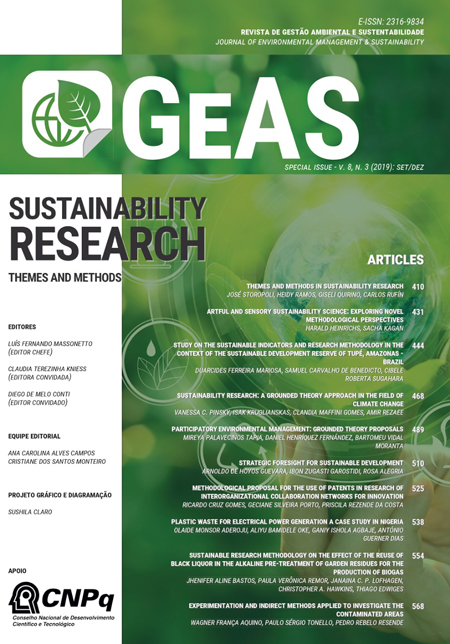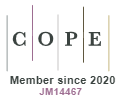SUSTAINABILITY RESEARCH: A GROUNDED THEORY APPROACH IN THE FIELD OF CLIMATE CHANGE
DOI:
https://doi.org/10.5585/geas.v8i3.15766Palabras clave:
Construcción de teoría, Teoría fundamentada, Investigación en desarrollo sostenible, Soft science, REDD, Cambio climático.Resumen
El cambio climático es un problema global complejo e incierto porque es impulsado por el comportamiento humano, con riesgos a largo plazo relacionados con el clima para los sistemas naturales y humanos. Los cambios en el comportamiento humano, el flujo de financiamiento, los instrumentos de política y la gobernanza multinivel son necesarios para mitigar y gestionar los principales riesgos climáticos. Comprender las dimensiones sociales del cambio climático es, literalmente, un tema candente para estudiar. La mayor parte de la literatura científica en el campo se centra en la "hard science". En las ciencias sociales aplicadas se utilizan diferentes métodos de construcción de la teoría. Sin embargo, el uso del enfoque de la teoría fundamentada en la investigación del sustentabilidad, especialmente sobre la "soft science" en el campo del cambio climático, es escaso. El propósito de este documento es discutir el uso del método de la teoría fundamentada en un campo de investigación emergente que combina la gobernabilidad y el cambio climático. El artículo presenta resultados sustanciales de un marco teórico emergente que explica el proceso de gobernanza de REDD + en Brasil, un mecanismo de financiamiento climático de la Convención Marco de las Naciones Unidas sobre el Cambio Climático (CMNUCC) centrado en mitigar las emisiones relacionadas con los bosques en los países en desarrollo. En vez de discutir sobre los mejores procedimientos y técnicas para construir una teoría, que pueden ser accedidas en varias publicaciones revisadas por pares, este artículo presenta una guía práctica y discute las lecciones aprendidas para integrar el ‘Modelo Teórico de Gobernanza en REDD+’. Académicos y post-graduandos son alentados a probar y validar (o no) el modelo teórico emergente en ese estudio.
Descargas
Citas
Biernacki, P., & Waldorf, D. (1981). Snowball sampling: Problems and techniques of chain referral sampling. Sociological methods & research, 10(2), 141-163.
Charmaz, K. (1983). The grounded theory method: An explication and interpretation. Contemporary field research, 109-126.
Charmaz, K. (1996). The Search for Meanings - Grounded Theory. In J. A. Smith, R. Harre, & L. Van Langenhove (Eds.), Rethinking Methods in Psychology (pp. 27–49). London: SAGE Publications. https://doi.org/10.1016/B978-0-08-044894-7.01581-5
Corbera, E., & Schroeder, H. (2011). Governing and implementing REDD+. Environmental Science and Policy, 14(2), 89–99. doi:10.1016/j. envsci.2010.11.002
Corbin, J. M., & Strauss, A. (1990). Grounded theory research: Procedures, canons, and evaluative criteria. Qualitative sociology, 13(1), 3-21.
Corbin, J., & Strauss, A. (2015). Basics of qualitative research: Techniques and procedures for developing grounded theory (4th ed.). Thousand Oaks, CA: Sage Publications.
Fatorelli, L., Gebara, M. F., May, P., Zhang, S., & di Gregorio, M. (2015). The REDD+ governance landscape and the challenge of coordination in Brazil. Bangor. Retrieved from http://www.cifor.org/library/5508/the-redd-governance-landscape-and-the-challenge-of-coordination-in-brazil/
Friese, S. (2013). Data analysis and theory-building tools. In ATLAS.ti 7 User Guide and Reference (p. 469). Berlin: ATLAS.ti Scientific Software Development GmbH. Retrieved from http://atlasti.com/wp-content/uploads/2014/05/ATLAS.ti-7-Network-Views.pdf
Glaser, B. (1978). Theoretical sensitivity. Advances in the methodology of grounded theory.
Glaser, B. G., & Strauss, A. L. (1967) The discovery of grounded theory: strategies for qualitative research. Chicago: Aldine.
Goulding, C. (2002). Grounded Theory: A Practical Guide for Management, Business and Market Researchers (1st ed.). London: SAGE Publications.
Greene, J. C., Caracelli, V. J., & Graham, W. F. (1989). Toward a Conceptual Framework for Mixed-Method Evaluation Designs. Educational Evaluation and Policy Analysis, 11(3), 225–274. doi:10.3102/01623737011003255
Hall, W. A., & Callery, P. (2001). Enhancing the rigor of grounded theory: Incorporating reflexivity and relationality. Qualitative health research, 11(2), 257-272.
Hueser, N. G. (1999). Grounded Theory Research: Not for The Novice.
Ikeda, A. A., & Bianchi, E. maria P. G. (2009). Considerações Sobre Usos e Aplicações da Grounded Theory em Administração. Faces R. Adm, 8(2), 107–122.
INPE. (2019, May 28). PRODES – Monitoramento da Floresta Amazônica Brasileira por Satélite. Available at http://www.obt.inpe.br/OBT/assuntos/programas/amazonia/prodes. Last update 11/23/2018.
IPCC. (2014). Climate Change 2014 Synthesis Report - Summary for Policymakers. Retrieved from https://www.ipcc.ch/pdf/assessment-report/ar5/syr/AR5_SYR_FINAL_SPM.pdf
Jick, T. D. (1979). Mixing Qualitative and Quantitative Methods: Triangulation in Action. Administrative Science Quarterly, 24(4), 602–611.
Johnson, B., & Turner, L. A. (2003). Data collection strategies in mixed methods research. Handbook of mixed methods in social and behavioral research, 297-319.
Johnson, R. B., Onwuegbuzie, A. J., & Turner, L. A. (2007). Toward a Definition of Mixed Methods Research. Journal of Mixed Methods Research, 1(2), 112–133.
Kennel, C. F., Briggs, S., & Victor, D. G. (2016). Better indicators for risk management are needed after Paris. Science, 354(June 2008), 421–422.
Korhonen-Kurki, K., Brockhaus, M., Efrian, M., Juhola, S., Moira, M., Cynthia, M., & Bimo, D. (2017). Analyzing REDD+ as an experiment of transformative climate governance: Insights from Indonesia. Environmental Science and Policy, 73(December 2016), 61–70. doi:10. 1016/j.envsci.2017.03.014
Lederer, M. (2012). REDD+ governance. Wiley Interdisciplinary Reviews: Climate Change, 3(1), 107–113. doi:10.1002/wcc.155
Marcovitch, J., & Pinsky, V. C. (2014). Amazon fund: Financing deforestation avoidance. Revista de Administração, 49, 280–290. doi:10.5700/rausp1146
Masson-Delmotte, V., Zhai, P., Pörtner, H.-O., Roberts, D., Skea, J., Shukla, P. R., … Waterfield, T. (2018). Summary for Policymakers. Global Warming of 1.5°C. An IPCC Special Report on the impacts of global warming of 1.5 oC above pre-industrial levels. Global Warming of 1.5°C. An IPCC Special Report on the impacts of global warming of 1.5°C above pre-industrial levels and related global greenhouse gas emission pathways, in the context of strengthening the global response to the threat of climate change,. https://doi.org/10.1017/CBO9781107415324
Mathison, S. (1988). Why Triangulate? Educational Researcher, 17(2), 13–17. doi:10.3102/0013189X017002013
Miles, M. B., Huberman, A. M., & Saldaña, J. (2013). Qualitative data analysis: A methods sourcebook. 3rd ed. Thousand Oaks, CA: Sage.
Morse, J. M., Barrett, M., Mayan, M., Olson, K., & Spiers, J. (2002). Verification Strategies for Establishing Reliability and Validity in Qualitative Research. International Journal of Qualitative Methods, 1(2), 13–22. http://doi.org/10.1177/160940690200100202
Pinsky, V. C. (2017). Experimentalist Governance in Climate Finance: the case of REDD+ in Brazil. University of Sao Paulo. Retrieved from http://www.teses.usp.br/teses/disponiveis/12/12139/tde-14122017-163027/pt-br.php
Pinsky, V. C., Kruglianskas, I., & Victor, D. G. (2019). Experimentalist governance in climate finance: the case of REDD+ in Brazil. Climate Policy, 0(0), 1–14. https://doi.org/10.1080/14693062.2019.1571474
Pozzebon, M., Petrini, M., de Mello, R. B., & Garreau, L. (2011). Unpacking researchers’ creativity and imagination in grounded theorizing: An exemplar from IS research. Information and Organization, 21(4), 177–193. https://doi.org/10.1016/j.infoandorg.2011.09.001
Prins, G., & Rayner, S. (2007). The Wrong Trousers: Radically Rethinking Climate Policy. James Martin Institute for Science and Civilization, University of Oxford and the MacKinder Centre for the Study of Long-Wave Events, London School of Economics. Retrieved from http://eureka.bodleian.ox.ac.uk/66/1/TheWrongTrousers.pdf
Sabel, C. F., & Zeitlin, J. (2008). Learning from difference: The new architecture of experimentalist governance in the EU. European Law Journal, 14(3), 271–327. https://doi.org/10.1111/j.1468-0386.2008.00415.x
Sampieri, R. H., Collado, F. & Lucio, C. B. P. (2006). Metodologia de pesquisa. 3. ed. São Paulo: McGraw-Hill.
Stern. (2007). Stern Review on the Economics of Climate Change. Journal of Economic Literature, 7(4), 233–724. doi:10.1257/jel.45.3.703
Strauss, A. L. (1987). Qualitative analysis for social scientists. Cambridge university press.
Strauss, A., & Corbin, J. (1990). Basics of qualitative research: Grounded theory procedures and techniques. Newbury Park, CA: Sage.
Suddaby, R. (2006). From the Editors: What Grounded Theory Is Not. Academy of Management Journal, 49(4), 633–642. https://doi.org/Editorial
Sutton, R. I., & Staw, B. M. (1995). What Theory is Not. Administrative Science Quarterly, 40(3), 371–384. Retrieved from http://links.jstor.org/sici?sici=0001-8392%28199509%2940%3A3%3C371%3AWTIN%3E2.0.CO%3B2-F Administrative
Tashakkori, A., & Teddlie, C. (Eds.). (2003). Sage handbook of mixed methods in social & behavioral research. Sage Publications.
UN Environmental Programme. (2019). Global Environment Outlook – GEO-6: Summary for Policymakers. Cambridge. https://doi.org/10.1017/9781108639217
Van der Werf, G. R., Morton, D. C., DeFries, R. S., Olivier, J. G. J., Kasibhatla, P. S., Jackson, R. B., … Randerson, J. T. (2009). CO2 emissions from forest loss. Nature Geoscience, 2(11), 737–738. https://doi.org/10.1038/ngeo671
Wagner, G., & Zeckhauser, R. J. (2012). Climate policy: Hard problem, soft thinking. Climatic Change, 110(3–4), 507–521. https://doi.org/10.1007/s10584-011-0067-z
Yin, R. K. (2004). The case study anthology. Sage.
Descargas
Publicado
Cómo citar
Número
Sección
Licencia
Derechos de autor 2019 Revista de Gestão Ambiental e Sustentabilidade

Esta obra está bajo una licencia internacional Creative Commons Atribución-NoComercial-CompartirIgual 4.0.










